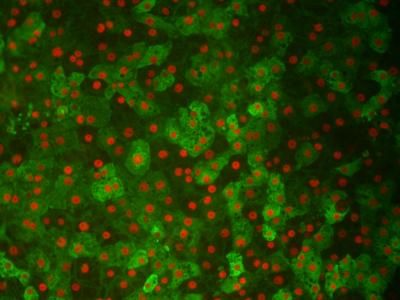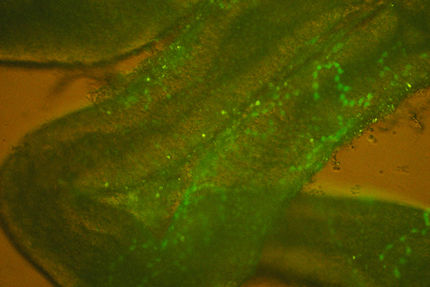Liver cells grown from patients' skin cells
Treatment of liver diseases possible
Advertisement
Scientists at The Medical College of Wisconsin in Milwaukee have successfully produced liver cells from patients' skin cells opening the possibility of treating a wide range of diseases that affect liver function. The study was led by Stephen A. Duncan, D. Phil., Marcus Professor in Human and Molecular genetics, and professor of cell biology, neurobiology and anatomy, along with postdoctoral fellow Karim Si-Tayeb, Ph.D., and graduate student Ms. Fallon Noto.

These are liver cells generated from skin that are shown to make human liver proteins Albumin in green and HNF4 in red.
Medical College of Wisconsin
"This is a crucial step forward towards developing therapies that can potentially replace the need for scarce liver transplants, currently the only treatment for most advanced liver disease," says Dr. Duncan.
The Medical College research team generated patient–specific liver cells by first repeating the work of James Thomson and colleagues at University of Wisconsin-Madison who showed that skin cells can be reprogrammed to become cells that resemble embryonic stem cells. They then tricked the skin–derived pluripotent stem cells into forming liver cells by mimicking the normal processes through which liver cells are made during embryonic development.
At the end of this process, the researchers found that they were able to very easily produce large numbers of relatively pure liver cells in laboratory culture dishes. "We were excited to discover that the liver cells produced from human skin cells were able to perform many of the activities associated with healthy adult liver function and that the cells could be injected into mouse livers where they integrated and were capable of making human liver proteins," says Dr. Duncan.
Several studies have shown that liver cells generated from embryonic stem cells could potentially be used for therapy. However, the possible use of such cells is limited by ethical considerations associated with the generation of embryonic stem cells from preimplantation embryos and the fact that embryonic stem cells do not have the same genetic make-up as the patient.
Although the investigations are still at an early stage the researchers believe that the reprogrammed skin cells could be used to investigate and potentially treat metabolic liver disease. The liver may be particularly suitable for stem-cell based therapies because it has a remarkable capacity to regenerate. It is possible that in the future a small piece of skin from a patient with loss of liver function could be used to produce healthy liver cells, replacing the diseased liver with normal tissue.





















































